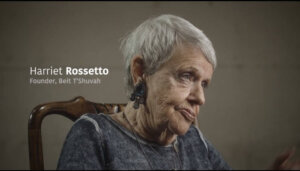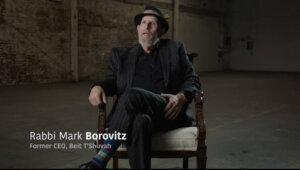This might just be the unlikeliest Jewish couple you’ve ever seen in a movie
Harriet Rossetto and Mark Borovitz find happiness in ‘The Jewish Jail Lady and the Holy Thief’

Graphic by Angelie Zaslavsky
Barry Rosenthal’s documentary, The Jewish Jail Lady and the Holy Thief, is a mind-blowing character study. It casts its lens on addiction therapy, religion and how personal interactions are culturally informed. It touches on boardroom dynamics. Oh, and by the way, it’s a love story.
Its centerpiece is Rabbi Mark Borovitz, a 70-ish, counterculture ex-con and recovering alcoholic, and his wife, Harriet Rossetto, a self-admitted sexually promiscuous Jewish intellectual, now in her mid-80s. Together they have saved thousands of lives through Beit T’Shuvah, an LA-based addiction recovery and treatment center, which she founded.
The film opens with Rabbi Ed Feinstein of Valley Beth Shalom in Encino, California, introducing Borovitz to his congregation, dubbing him “irreverent, inappropriate, cantankerous, ill-tempered, crude, filthy mouthed, a common thief, a con artist, a flimflam man, difficult, really, really difficult, a pain in the ass and my best friend.”
Sporting a jaunty hat with a small feather and a slightly shiny black striped suit, Borovitz addresses the temple-goers, “Hiya doin’? I’m the lunatic rabbi, also known as the holy thief.”
He’s also, improbably, the husband of social worker Harriet Rossetto who is 14 years his senior. Nonetheless, they share much in common.
Both Rossetto and Borovitz lost their fathers at 14, and early on, were conversant in loss, grief, guilt and duplicity. A dutiful son and brother, Borovitz was also a heavy drinker and a petty criminal, mostly hustling stolen goods on consignment for low-level Mafioso types and later forging checks.

By her sophomore year, Harriet dutifully found a Jewish, Harvard-trained lawyer, lived the suburban, well-appointed home life and within short order was sleeping all over town. She liked bad boys, Italians more than Jews, and so while vacationing in Italy, she married an Italian with whom she had a daughter. That marriage was short-lived too, and parenting was alien to her. More ill-fated affairs followed, culminating in a tumultuous romance with an elevator man who toted a gun and chased her down the street with a broken bottle threatening to kill her.
Rossetto and Borovitz came of age in an era where transparency was paramount. Euphemism and amenities were shunned. Our protagonists undoubtedly live out loud. It’s easy to envision them seated on chairs facing an audience in an Off-Broadway theater, playing themselves. The line between personal revelation and performance is blurred.
Turning points
Spirituality and religion played a part in Borovitz and Rossetto’s epiphanies. Though he had eschewed religion for decades, after he was incarcerated in 1986, he had a religious reawakening and began to study the work of Rabbi Abraham Joshua Heschel, a leading Jewish theologian-philosopher of the 20th century and a leader in the civil rights movement. While still serving his time, Borovitz became the clerk for the prison rabbi.
Like the proverbial wandering Jew and the mythic American seeking her fortune, in the early ’80s and veering close to her 50th birthday, Rossetto landed in Los Angeles, lost, rootless and devoid of purpose.
She was on the verge of suicide when a friend introduced her to a psychic of sorts who asked if she prayed.
“Of course I don’t pray,” Rossetto said. “I’m an intellectual Jew. I don’t pray.”
The psychic responded that she would pray for her, urging Rossetto to keep watch.
Within days, Rossetto came across a help wanted ad in the paper: “Person of Jewish background and culture to work with Jewish criminal offenders. MSW required.”
She was floored when it all came together. “I’m a nice Jewish girl with an MSW, I like bad boys, and here it is,” Rossetto said.

She spent her days visiting Jewish prisoners through the Jewish Committee for Personal Service in State Prisons and Mental Hospitals, and became known as “The Jewish Jail Lady.”
Almost immediately she was struck by how many of her charges battled substance abuse issues and, more troubling, after they were released, they had no place to go. It didn’t take too long for them to be off the wagon and back in jail.
In 1986, Rossetto received a federal grant and bought a house in Los Angeles launching Beit T’Shuvah, where newly released prisoners found fellowship and a roof over their heads.
Love was not part of her plan.
An unexpected love story
Rossetto’s first meeting with Borovitz was not promising. Visiting the California Institution for Men (CIM) in Chino, Rossetto encountered him as an inmate, and he bombarded her with a series of aggressive questions.
“‘What does this bleeding-heart liberal, social worker know about what convicts need?’” she remembered him saying. “I hated him. He was arrogant, abrasive, a know-it-all.”
“If you’re so smart, when you get out, you can come help me,” she told him.
When he was released in 1988, unable to find work, he took her up on her offer.
Because he was a hustler, she employed him to run her newly formed thrift shop, with proceeds earmarked for Jewish convicts. He was a fine salesman. He also worked as her secretary, and led an off-the-beaten track daily Torah study group with the ex-con residents. His tough-love spirituality-pedagogy-therapy was regarded as somewhat unorthodox.

“My Torah was a street Torah,” he said. “Real life, real time.”
“He spoke the language of the people,” said Rossetto. “Who better to teach them spiritually than someone who came from the same place they did.”
The two tied the knot in 1990. Bolstered by her support, Borovitz applied to rabbinical school at the University of Judaism in LA. In 2000, he was ordained and walked off with a master’s degree in rabbinic literature. He gained a reputation as a “prophet, more than a rabbi,” he said.
Beit T’Shuvah
Borovitz and Rossetto viewed Beit T’Shuvah, a treatment regimen that combines the 12-step program with psychotherapy, job-skill training and Jewish spirituality, as their child, their identity, their new addiction.
“The center’s focus became “recover your passion, discover your purpose.” Rossetto said. “But really what worked was building a community where people could belong. The opposite of addiction is not sobriety, but connection.”
Throughout the film, former clients testify how their lives were saved thanks to their Beit T’Shuvah stint. One was a cocaine addict; another, a gang member.
“The breadth and the scope of what they do for a single individual and their family is nothing I’ve ever seen,” recalled a woman who credit’s Beit T’Shuvah with saving her from alcohol abuse.
“There’s a very beautiful Yiddish teaching that guided me from the very beginning that to save one soul is as if you have saved the whole world,” Rossetto said.
Rosenthal, the film’s director, noted that the rabbi and Rossetto unwittingly brought him out of retirement to launch a new career as a documentary maker after 45 years in the advertising business.
Living in Marina Del Rey, he had been sober for nearly a decade when someone suggested he attend a Shabbat service at the recovery program.
“What I witnessed was a packed house listening to Shabbat service sung to Beatles music,” Rosenthal recalled via email. “I thought, ‘Now, that’s a good way to get people back to shul.’”
Rosenthal is hopeful that the film will show viewers “what can be done with dedication, hard work, passion and love.
“I also wanted to keep shining a light on the issues of substance abuse and recovery and Rabbi and Harriet’s unique take on them,” he added. “It was also to showcase the heartbreak of eventually being finessed out of the very organization they founded.”
What precisely led to the end of their tenure at Beit T’shuvah, after 30-plus years, is not entirely clear. Rossetto blames a culture that has become altogether too polite and “founder’s syndrome,” referring to what may happen when the enthusiastic creators of an organization become perceived as too controlling.
In the rabbi’s valedictory speech, he apologized to anyone he may have hurt,, conceding that his therapeutic approach, or perhaps just his way of being in the world, is not for all tastes.
Still, one can’t help envying the couple. In another marriage, the loss of their 35-year-old baby, as it were, could easily have led to the end of their relationship. But that didn’t happen here.
“When we got married, we had written a vow that we would never use the vulnerability of the other person against them in hurt or anger,” Rossetto said. “We have honored that vow for 32 years.”
“The glue that held us together got even stronger,” said Borovitz. “Our relationship is our home. It is the promised land for us.”
Jewish Jail Lady Trailer from barry rosenthal on Vimeo.















